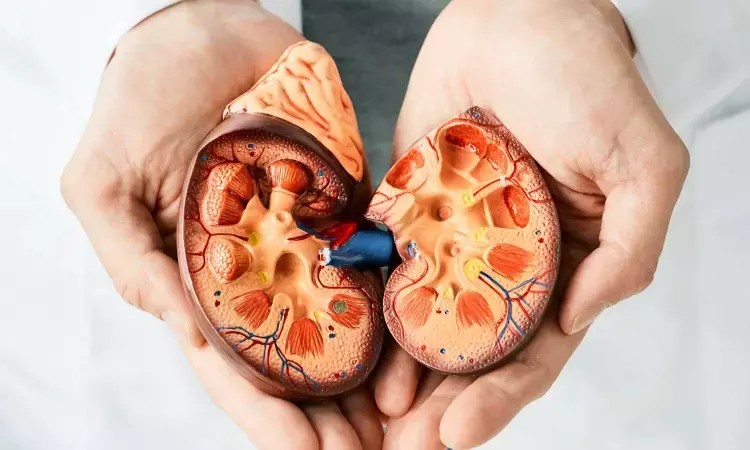- Home
- Medical news & Guidelines
- Anesthesiology
- Cardiology and CTVS
- Critical Care
- Dentistry
- Dermatology
- Diabetes and Endocrinology
- ENT
- Gastroenterology
- Medicine
- Nephrology
- Neurology
- Obstretics-Gynaecology
- Oncology
- Ophthalmology
- Orthopaedics
- Pediatrics-Neonatology
- Psychiatry
- Pulmonology
- Radiology
- Surgery
- Urology
- Laboratory Medicine
- Diet
- Nursing
- Paramedical
- Physiotherapy
- Health news
- Fact Check
- Bone Health Fact Check
- Brain Health Fact Check
- Cancer Related Fact Check
- Child Care Fact Check
- Dental and oral health fact check
- Diabetes and metabolic health fact check
- Diet and Nutrition Fact Check
- Eye and ENT Care Fact Check
- Fitness fact check
- Gut health fact check
- Heart health fact check
- Kidney health fact check
- Medical education fact check
- Men's health fact check
- Respiratory fact check
- Skin and hair care fact check
- Vaccine and Immunization fact check
- Women's health fact check
- AYUSH
- State News
- Andaman and Nicobar Islands
- Andhra Pradesh
- Arunachal Pradesh
- Assam
- Bihar
- Chandigarh
- Chattisgarh
- Dadra and Nagar Haveli
- Daman and Diu
- Delhi
- Goa
- Gujarat
- Haryana
- Himachal Pradesh
- Jammu & Kashmir
- Jharkhand
- Karnataka
- Kerala
- Ladakh
- Lakshadweep
- Madhya Pradesh
- Maharashtra
- Manipur
- Meghalaya
- Mizoram
- Nagaland
- Odisha
- Puducherry
- Punjab
- Rajasthan
- Sikkim
- Tamil Nadu
- Telangana
- Tripura
- Uttar Pradesh
- Uttrakhand
- West Bengal
- Medical Education
- Industry
PCSK9 levels in T2DM patients linked to renal function impairment

A new study by Zhicai Feng and team found that in type 2 diabetes mellitus (T2DM) patients, serum proprotein convertase subtilisin/kexin type 9 (PCSK9) levels are linked to renal function impairment, and in certain people, lowering PCSK9 may assist to reduce chronic kidney disease. The findings of this study were published in Renal Failure.
Diabetes mellitus (DM) is a long-term metabolic condition. 536.6 million individuals worldwide had diabetes mellitus (DM) in 2021, making about 10.5% of the adult population. Mostly produced as zymogen in the endoplasmic reticulum of hepatocytes, PCSK9 is a serine kinase that is then released into plasma via autocatalytic shearing. Additionally, the kidney and colon are capable of producing it. There is a strong correlation between PCSK9 and DM patients. The aim of this study was to examine the relationship between renal function impairment in individuals with type 2 diabetes mellitus and blood PCSK9 levels.
In T2DM patients, STZ + HFD mice, human proximal tubular epithelial (HK-2) cells administered with high glucose plus palmitic acid (HGPA), and the equivalent control groups, PCSK9 levels were assessed. According to the blood PCSK9 levels, the T2DM patients were further separated into three groups.
The key findings of this study were:
1. In humans, mice, and HK-2 cells, PCSK9 levels were greater in the DM group than in the control group.
2. Systolic blood pressure, serum creatinine, blood urea nitrogen, triglycerides, and urine 1-MG/urine creatinine ratio (UCR) values were all substantially higher in PCSK9 tertile 3 than they were in PCSK9 tertile 1 (p 0.05).
3. In comparison to PCSK9 tertiles 1 and 2, the DBP and UACR values were substantially higher in PCSK9 tertile 3 (both p 0.05).
4. Additionally, URCR values in PCSK9 tertiles 3 and 2 were substantially greater than in PCSK9 tertile 1 (both p 0.05).
5. SBP, Scr, BUN, TG, URCR, UCR, and UACR were all favorably connected with serum PCSK9 levels, but eGFR was negatively correlated.
6. Serum PCSK9 levels in STZ + HFD mice showed a positive correlation with Scr, BUN, and UACR, which was in line with the observations in human patients.
7. According to a logistic regression model, serum PCSK9 is a unique risk factor for UACR 30 mg/g and eGFR 60 mL/min/1.73 m2 levels.
8. The ROC curve revealed that the optimal cutoff values for UACR 30 mg/g and eGFR 60 mL/min/1.73 m2, respectively, were 170.53 ng/mL and 337.26 ng/mL PCSK9.
This study discovered that in T2DM patients, blood PCSK9 levels were directly related to urine albumin, eGFR, and renal tubular damage. Furthermore, albuminuria and renal insufficiency were independently risky conditions for PCSK9. These recent discoveries offer possible treatment options that might help individuals with T2DM achieve better renal outcomes.
Reference:
Feng, Z., Liao, X., Zhang, H., Peng, J., Huang, Z., & Yi, B. (2023). Increased serum PCSK9 levels are associated with renal function impairment in patients with type 2 diabetes mellitus. In Renal Failure (Vol. 45, Issue 1). Informa UK Limited. https://doi.org/10.1080/0886022x.2023.2215880
Neuroscience Masters graduate
Jacinthlyn Sylvia, a Neuroscience Master's graduate from Chennai has worked extensively in deciphering the neurobiology of cognition and motor control in aging. She also has spread-out exposure to Neurosurgery from her Bachelor’s. She is currently involved in active Neuro-Oncology research. She is an upcoming neuroscientist with a fiery passion for writing. Her news cover at Medical Dialogues feature recent discoveries and updates from the healthcare and biomedical research fields. She can be reached at editorial@medicaldialogues.in
Dr Kamal Kant Kohli-MBBS, DTCD- a chest specialist with more than 30 years of practice and a flair for writing clinical articles, Dr Kamal Kant Kohli joined Medical Dialogues as a Chief Editor of Medical News. Besides writing articles, as an editor, he proofreads and verifies all the medical content published on Medical Dialogues including those coming from journals, studies,medical conferences,guidelines etc. Email: drkohli@medicaldialogues.in. Contact no. 011-43720751


